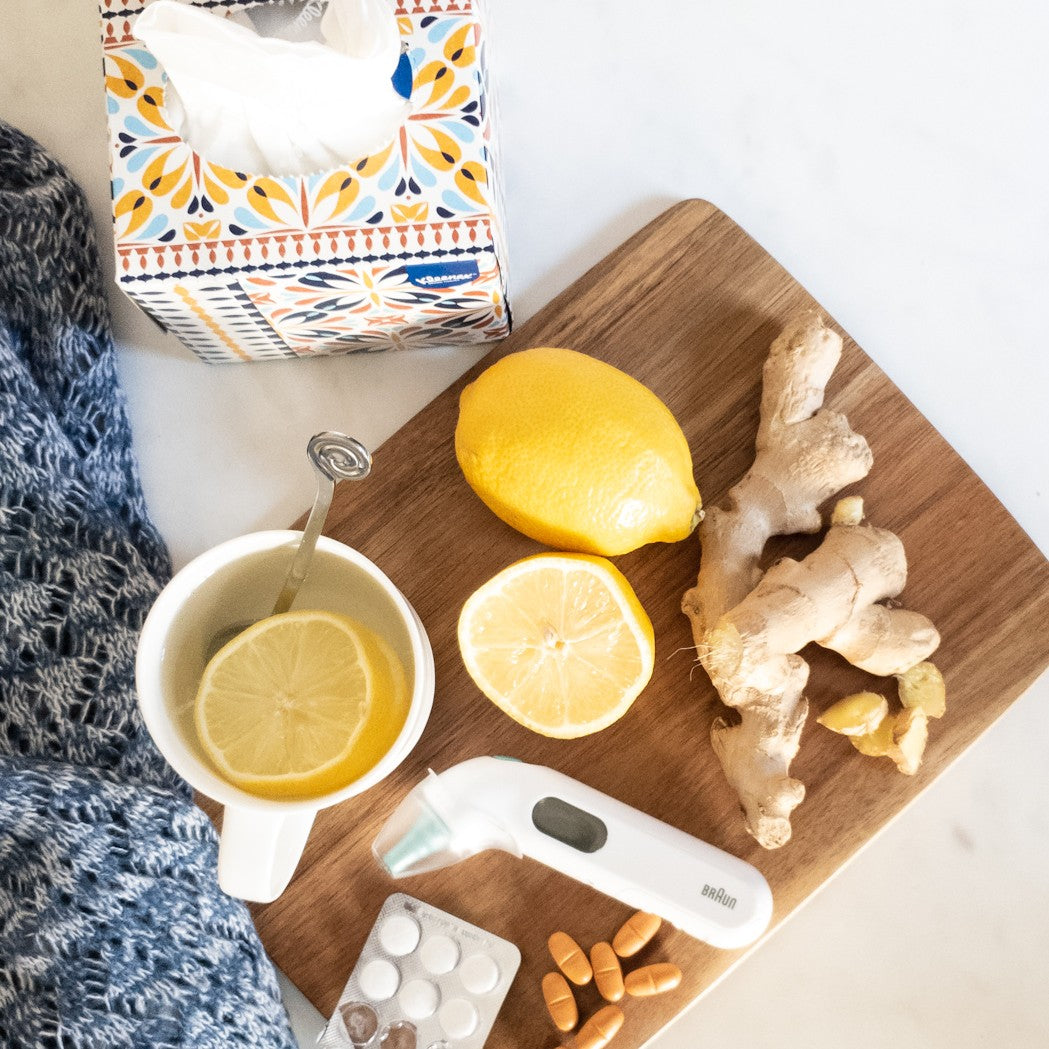Your Cart is Empty
Buy Now

Info & Care guideline if mum gets a cold of flu while breastfeeding - By Lactation Consultant Niyati Naik
June 18, 2019 3 min read
Despite efforts to stay as healthy as possible, the truth is that even mums get sick. Having a baby brings about a huge change to a family’s lifestyle, eating patterns, sleep (or lack thereof) and behaviours. Here are some tips to guide you, regarding what to do if you start feeling ill with a cold or flu.
Do not Stop Breastfeeding
Your baby has already been exposed to whatever bug it may be that is making you sick. It is therefore essential to continue breastfeeding, and even increase frequency if possible. This is so that the antibodies (made by you) against the bug, can pass through your breastmilk to protect your infant. Apart from this amazing anti-infective effect, your breastfeeding will also soothe and calm your baby, whilst releasing oxytocin to make you feel better.
Seek Help
If you have help and support at home, it may be useful to allow someone else to change your baby’s nappies, do the bathing and burping; whilst you rest and breastfeed when needed. If possible, get friends and family to bring you nutritious foods or help you with cleaning. If possible, it may be useful to hire the help.
Keep Hydrated
You may have a reduced appetite if you are not feeling well, however, it is important to maintain or increase fluid intake when you feel ill, so that the toxins can be flushed out of your system. Having hot drinks may be soothing and therapeutic. Be careful if you are drinking jungle juice, as too much sugar intake can lead to increased weight gain and increased risk of thrush. Brews and teas can be made with honey, ginger, lemon, cinnamon and turmeric.
Keep warm
Your body will naturally increase in temperature to fight off any infection that may be brewing. You may find it useful to take paracetamol and ibuprofen (at staggered times) to control any pain and reduce fever. It is important for you to keep warm and wear socks. It is also useful for you to get fresh air at least once a day.
Supplements/ Natural & Homeopathic medications
These medications may help to boost your immune system and are safe to take whilst breastfeeding:
- Coryzalia homeopathic tablets
- Oscillococcinium viles
- Buffered Vitamin C
- Tissue salts ~ 4 (for inflammation)
- Prospan/Hedelix/Linctagon for coughing
- Echinacea
- Zinc lozenges
- Probiotics/Kefir
- Sinpret Forte
- Bionorica
It is also safe for breastfeeding mums to take vitamin C supplements to increase immunity.
Allopathic/ Western Medication
Be careful about what ‘flu’ medication that you take, Avoid medications that contain anti-histamines as this may reduce your milk supply. Iliadin pediatric nasal spray, saline, expigen/cetralin, paracetamol, ibuprofen and ACC 200 may be used as they are safe for breastfeeding mothers. If you use rubs such as vicks etc, be sure to wash your hands after you apply it, and be careful where you apply it so that it does not come into contact with your baby whilst breastfeeding.
If you have a fever that is not settling, you may need to see your doctor for antibiotics.
Other Interventions
In order to loosen phlegm, you may benefit from physiotherapy (percussion) and chiropractic. Steaming with eucalyptus salts or essential oils can be done at home and should not be done in 20 minutes after taking the homeopathic remedies.
What about my baby
If possible, get a family member or friend to help you to look after your baby whilst
you recover. They may help with the ‘contact’ activities, however it is important that you do not stop breastfeeding. If anything, you should increase your breastfeeding if possible to pass on the vital immune factors to your baby. If required, you may use a surgical mask whilst breastfeeding, to protect your baby from droplets of infection. Use saline solution frequently, for your baby to draw out any mucous, especially before a feed. Monitor your baby’s temperature, output, feeding and breathing. If you are concerned about any of the above, do not hesitate to contact your doctor for further advice.
Remember to monitor your baby’s intake
Check that your baby is having at least 6-8 wet nappies and regular stool. Also monitor her weight to ensure that she is getting enough nutrition and hydration for her growing needs. Rather than looking at a feed in isolation, monitor what her intake is over a 24-hour period. Remember, if your baby is congested or cannot
breathe effectively through her nostrils, it is likely that she will fuss when you try to
breastfeed her, as we will all choose breathing over eating.
Saline, breastmilk and various suction tools can be used to relieve your baby’s congestion. Breastmilk has the perfect combination of hydration, nutrition and immune factors for your baby’s wellbeing.
Don’t forget to wash your hands regularly with soap and hot water and change your hand towels to prevent cross-contamination and the spread of germs.

Subscribe
Sign up to get the latest on sales, new releases and more …










